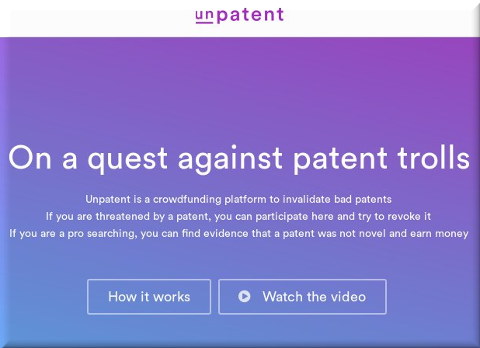
Summary: The USPTO must up its game on patent quality (not relying on PTAB and the courts correcting its errors after the grants) or face growing backlash that tarnishes its public image
When rogue entities like patent trolls and greedy lawyers virtually take over the patent system (for self enrichment, not for innovation) it leads to blowback like this. That's just what happens when your patent office approves nearly every crappy application:
Unpatent Launches Combination Crowdfunding/Crowdsourcing Platform To Invalidate Stupid Patent
I'm always super interested in new ideas for hacking the patent system to get around just how broken it is -- and the fact that Congress still seems to have no real desire to fix things -- mainly because some of the largest patent system exploiters are standing in the way of necessary reform. So it's always cool to hear of new ideas to try to fix things without having to bother with changing the law.
The latest interesting idea: Unpatent -- a combination crowdfunding/crowdsourcing platform with the goal of invalidating stupid patents. Each stupid patent gets its own crowdfunding campaign, in which Unpatent looks to raise at least $20,000. This money does two things: it is used to pay for a legal challenge (a so-called "ex parte" challenge) of the patent at the Patent Office and to pay out rewards to those who find the compelling prior art to invalidate the patent. As you've likely figured out by now, that's where the crowdsourcing comes in. Individuals can submit their own prior art examples, and if their examples are used in invalidating the patent, they can share in some of the money raised.
They're kicking it off by challenging a patent on customizing stuff on the internet. It's US Patent 8,738,435 on a "method and apparatus for presenting personalized content relating to offered products and services." If that sounds familiar, it's because it was EFF's "Stupid Patent of the Month" back in February. The company holding this patent, Phoenix Licensing, has filed a bunch of troll lawsuits in (of course) the Eastern District of Texas.
This sounds similar to initiatives we covered before. People clearly understand that the
USPTO (and growingly the
EPO too) grants many patents in error. Being granted a patent these days does not mean you invented something novel, at least not until some court looks properly into it (profound analysis).
"Despite Ongoing Efforts," says
this new headline from IP Watch (perhaps referring to PTAB, which
is under a constant attack), "USPTO Still Faces Patent Quality Issues" and to quote the outline: "The US Patent and Trademark Office continues to face claims of low patent quality despite a major initiative to address the situation. The agency has been the subject of several critical reports by oversight agencies and recently defended its patent quality improvements before Congress. Patent practitioners say that while patent quality may not actually have worsened over the past few years, the USPTO's ongoing lack of financial and other resources, and inconsistent judicial decisions, are among the factors causing problems."
One might think that the USTPO should heed the warning and stop issuing software patents. The courts sure don't like them. But no, the USPTO's examiners grant new software patents even though courts continue to invalidate them (
new example). Is this quality control?
Here is
a new brag that says "CyberArk, the cybersecurity company, announced on Wednesday (Sept. 14) it was awarded another patent by the U.S. Patent and Trademark Office for security risk detection technology."
Again, that's a software patent. There are many more like it and they serve to show that examiners at the USPTO are still doing a poor job. If there were to apply Section 101 (
Alice), then these applications would not get far.
Efforts such as Unpatent serves to damage the legitimacy of the USPTO (affecting also its reputation when it comes to trademarks, not just patents), so it's in the interest of the Office to correct this, in lieu with the
recent reports of
GAO.
⬆

